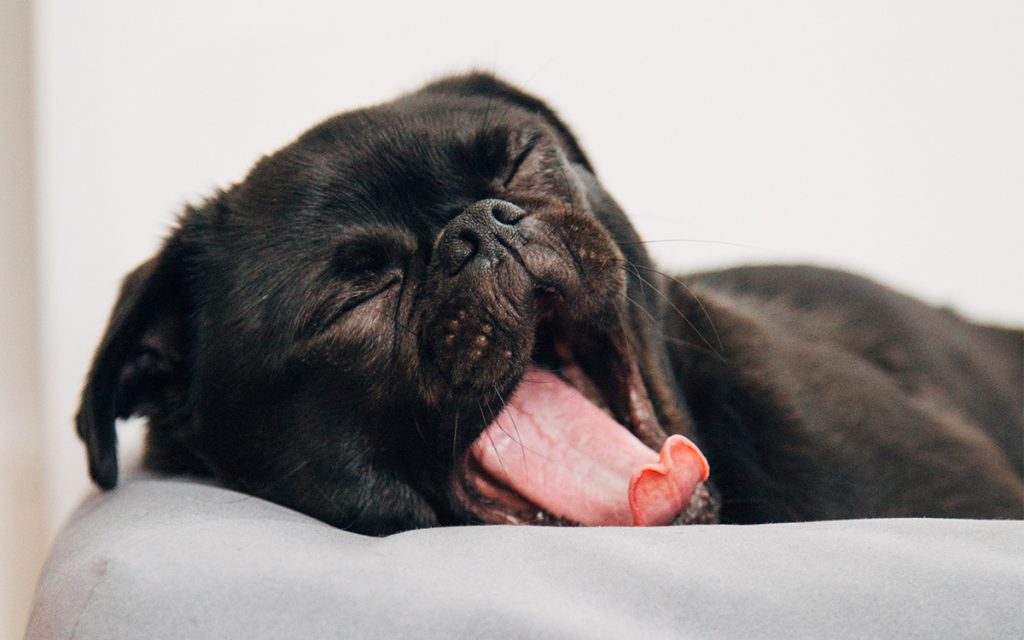Sleep: it’s that thing you’re supposed to be doing instead of binge watching Game of Thrones, #JonWinsTheThrone. This is maybe the most neglected part of training, which is bananas to me since sleeping is literally my favorite thing to do.
Getting enough sleep is one of the easiest, yet most effective ways to accelerate your fitness goals.
It is sometimes said that sleep, along with diet and exercise, is one of the three cornerstones of a healthy, functioning body. However, it is definitely the least glamorous of the three. Our feeds are full of people’s workouts and diets, but posts about sleep habits don’t seem to generate as many clicks.
Today’s culture rewards an “I’ll rest when I’m dead” mentality, and we often see influencers spouting about #EverydayGrind and #NoDaysOff. But all that stress placed on the body is for nothing if you’re not recovering adequately.
Here’s a rundown of how sleep affects performance and muscle growth accompanied by photos of dogs, the true experts of sleep.
Fact: Working out actually improves your sleep quality. Try a Fitplan today and start catching quality zzzs.

How Sleep Affects Athletic Performance
Let’s talk about sleep’s relationship with athletic performance. How does sleep deprivation affect what you can do during your workouts?
We’ll start with good news for those athletes who like to replace a good night’s sleep with an extra cup of coffee in the morning:
One study found that sleep deprivation did not actually have an effect on cardiovascular and respiratory responses to exercise at varying intensities. Furthermore, there was no measurable effect on the aerobic and anaerobic performance capabilities of the subjects [1].
This is surprising since if you kept me up all weekend and told me to go for a run, I’d find a bush to hide in so I could take a nap.
Now for the bad news. If we look at the time to exhaustion, that is, how long it takes to fatigue and stop the exercise you’re doing, we see that the less sleep you get, the worse/shorter your time to exhaustion is [1].
Also, ratings of perceived exertion increased during exercise in sleep-deprived subjects, meaning that the same amount of work done rested felt harder when sleep deprived [1].
Although I’d say that self-torture is one of the main reasons certain people enjoy working out.

How Sleep Affects Muscle Growth
Ok, so how does sleep deprivation influence your body’s physical response to training?
One 2010 study sought out the effects of sleep on body composition, and what percentage of body mass was fat versus muscle in people that maintain a moderate caloric deficit, i.e. eating fewer calories than they were burning [2].
Even though weight loss was the same, researchers found that sleeping about eight hours meant more fat loss and muscle retention when compared to sleeping only around five hours per day, which saw higher levels of muscle loss. This study found that the eight-hour group lost about 50% more fat than the five-hour group [2].
More research also supports the fact that sleep deprivation and restriction leads to negative effects on muscle retention and fat loss while in a calorie deficit [3].
If your fitness goal is to lose some weight and get a sexy six pack, remember, you need reps and rest.
You may think getting up at 4am to hit the gym and use the hashtag #riseandgrind on your Instagram is the ultimate MO, but you’re probably better off getting an extra hour of sleep and going a bit later.
I know #wellrested isn’t as catchy as #riseandgrind, but if you really care about your health, and not just projecting the image of a healthy, fit person on the internet, take your sleep seriously and do what you can to improve your sleeping habits.
It is a super easy and effective way to help your training. For most people, averaging seven to nine hours per night is a good place to start.
Works Cited:
1. Van Helder, T. & Radomski, M.W. Sports Medicine (1989) 7: 235. https://doi.org/10.2165/00007256-198907040-00002
2. Nedeltcheva, Arlet V et al. “Insufficient sleep undermines dietary efforts to reduce adiposity.” Annals of internal medicine vol. 153,7 (2010): 435-41. doi:10.7326/0003-4819-153-7-201010050-00006
3. Xuewen Wang, Joshua R Sparks, Kimberly P Bowyer, Shawn D Youngstedt, Influence of sleep restriction on weight loss outcomes associated with caloric restriction, Sleep, Volume 41, Issue 5, May 2018, zsy027, https://doi.org/10.1093/sleep/zsy027


